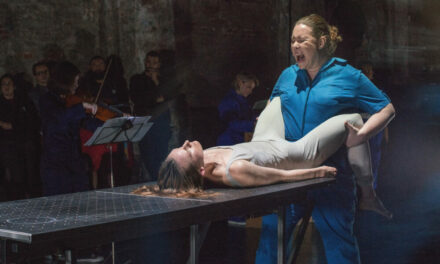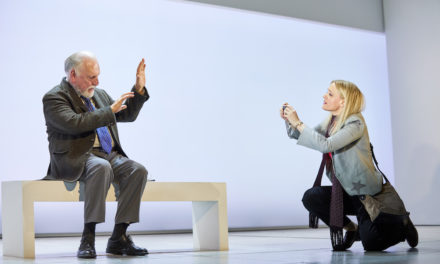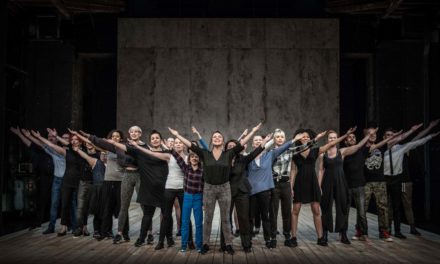Tadeusz Różewicz (1921-2014) might need a few words of introduction for English-speaking readers, although he shouldn’t. Poet, dramatist, writer of film scripts, prose writer, satirist, translator, he is one of the central figures of post-Second-World-War Polish (and European) literature. Author of plays from the 1960s through the 1990s – Kartoteka (The Card Index) (1960) and Do Piachu (Into the Sand) (1979) are well known, but there are many others – he was also a major poet, and recognized as such from the mid-1940s. Czesław Miłosz said of the early work that it transformed Polish verse, establishing some kind of sense after the horrors of 1939-1945 (which Różewicz knew and experienced at first hand). His poetry has been well-served in translation, as have his plays. In his long life, he became a classic, widely taught in schools, highly regarded by commentators of different political and social persuasions, and quite simply read by lots of people.

Tadeusz Różewicz. PC: Zbigniew Kulik.
In this anniversary year, Between.Pomiędzy devoted two sessions to Różewicz’s work – one as part of our educational program for high-school students, and one as part of a set of meetings on translating the work of famous writers. Both Różewicz sessions were conducted by Dr. Joanna Lisiewicz, Polish Różewicz scholar, author of a well-received study of silence in the works of Samuel Beckett and Różewicz (2017). I will concentrate on the second session in which there was a wide-ranging and thought-provoking discussion involving an international audience.
The first topic to be focused on was the reception. Lisiewicz and Tomasz Wiśniewski were primarily concerned with the reception of Różewicz although comparisons were frequently made to that of Beckett. Beckett, too, as a writer both similar to and different from Różewicz, was a recurrent point of reference.
Lisiewicz started with a provocative comparison of the ways in which Różewicz is presented differently in English and Polish introductions to his work. Tony Howard declares him a dramatist shaped by the experience of the Second World War; Martin Esslin declares him essentially a lyric poet whose visions shape the dramatic action of his absurdist plays. Lisiewicz contrasted these defining assertions with Czesław Miłosz’s noting that Różewicz came from a provincial city (Radomsko) and from a worker’s family. She found the difference striking, with Miłosz’s introduction opening up complex and nuanced perspectives on the writer’s work, as opposed to the doubtless useful but essentially categorizing comments of the English-language critics. “Is,” she noted is different from “comes from.”
Throughout her part of the discussion, Lisiewicz asked for a new look at Różewicz. She argued – and here the comparison with Beckett is germane – that even in Poland (despite Miłosz’s nuanced view) Różewicz is seen as a nihilist, creating a world in drama and verse that is utterly without optimism or hope. Różewicz himself – in a fashion quite unusual in Polish – felt able to say that, contrary to the established view of Beckett’s work, he (Różewicz) was perfectly able, or had become perfectly able, to read Happy Days as a comedy. Lisiewicz insisted that we need to think about Różewicz with similar freshness and from innovatory points of view. Polish secondary schools, she pointed out, drum it into students’ heads that Różewicz is a writer of the War, basing his work on his experiences as a partisan, on the experience of his brother’s death at the hands of the Gestapo, and on the experience of the moral and existential wasteland of the 1940s. However, since Różewicz’s œuvre is now complete, she argued, it is high time to attempt new readings, to look at his work afresh from the beginning to the end, and to take into consideration illuminating texts (the letters, for example) that are now available.
Tomasz Wiśniewski’s observations at this point reinforced Lisiewicz’s suggestions. Esslin, he argued, offers a simple answer to the question as to who Różewicz is, and places him in a fixed category (theatre of the absurd) which, in a sense, closes off the discussion. Wiśniewski went on to argue that clearly Beckett and Różewicz have much in common, but are, in his view, very different writers. Yes, both are heavily influenced by the existential abyss of the 1940s, but their work is different. He also noted that their social backgrounds were different (Beckett from a privileged Protestant background, Różewicz from a provincial and much more humble one). He also noted that Beckett’s experience of the Second War was different from Różewicz’s – Beckett a citizen of a neutral country (the Irish Free State) who chose to stay in France during the War, Różewicz a member of a nation destined by the Germans for exploitation and ultimate eradication. Różewicz and Beckett, he insisted, are very complex writers. Labels and stock phrases mislead. These writers also developed over time. In any case, Wiśniewski urged, in the time of the pandemic, the term “absurd” becomes hugely negotiable. There was substantial support from among guests that Różewicz is seen beyond established definitions. Lisiewicz declared that she wanted more; she wanted Różewicz to be read anew.
One of the principal ways in which he might be read anew is in terms of humor and this topic was taken up in the meeting. Jean Ward reminded us of Różewicz’s insistence that he was inclined to read Happy Days as a comedy. She also said that when one reads Różewicz’s poems in the collection Matka odchodzi (Mother’s Gone) in the context of accounts of the poet’s later life and records of his interactions with people of various ages and classes, a much less bleak sense of his work appears, which is reflected in fresh reading. Wiśniewski added here that Różewicz’s use of silence in his dramas cannot be reduced to one simple meaning, but in textual context assumes varieties of signification. He is by no means a writer that can be simply summed up.
The third topic of discussion – Różewicz’s distinctive craft – flowed naturally from the above. Lisiewicz stressed that Różewicz’s method was one of building, pulling down, and re-building. He himself distrusted absolute judgments and operated through antinomies that allow truths to emerge through the cracks between them. His plays breathe, Lisiewicz aptly declared, and that is why they are still alive, still relevant to new audiences, and, one imagines, will stay so in the future. She referred here to the earlier educational meeting with high-school students. They were able to respond to the plays and talk about their own concerns via the plays, precisely because of the multi-faceted nature of Różewicz’s work.

Tadeusz Różewicz. PC: Zbigniew Kulik.
The meeting then discussed matters related to the translation of Różewicz. The conclusion of early stages of the discussion was that although Różewicz’s language might seem informal and direct and relatively easy to translate (in a superficial sort of way), the Polish actually contains layers of meaning that are very difficult to render in English. The deeply metaphorical nature of Różewicz’s language is often missed, insisted Lisiewicz. Wiśniewski proposed a return to the texts of Różewicz’s work to scrutinize their semantic potential without the preconceptions of established opinion.
There followed a brief excursus on German translations and German and Austrian reception of Różewicz’s work by Wolfgang Görtschacher from Salzburg. The popularity that Różewicz enjoyed in the German-speaking world in the 1980s and 1990s seems to have waned, although institutional issues (copyright, publishing economics, and opportunities) may, as ever, play a role in this situation. There was also a brief discussion of the use of translations of Różewicz’s verse in poetry circles in the UK in the 1960s, largely to discredit a perceived little England mentality within contemporary British poetry.
In conclusion, Lisiewicz summed up some of the events relating to the anniversary of Różewicz’s birth. Events organized by the Grotowski Institute in Wrocław and the Polish Cultural Institute in London will be of particular interest to readers of Theatre Times. Personally, Joanna Lisiewicz concluded, she was waiting for Magdalena Grochowska’s biography of the dramatist and poet.
There may be more to say next year. In fact, there certainly will be. Watch this space.
Further information
https://www.wroclaw.pl/portal/tadeusz-rozewicz-biografia-magdalena-grochowska-premiera-2021
https://www.wroclaw.pl/rok-rozewicza/
This post was written by the author in their personal capacity.The opinions expressed in this article are the author’s own and do not reflect the view of The Theatre Times, their staff or collaborators.
This post was written by David Malcolm.
The views expressed here belong to the author and do not necessarily reflect our views and opinions.


















